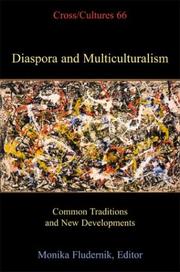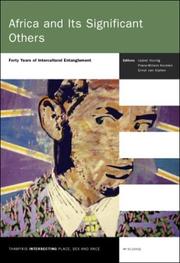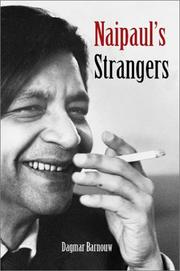| Listing 1 - 3 of 3 |
Sort by
|

ISBN: 9789004486539 9789042009165 Year: 2003 Publisher: Leiden; Boston : BRILL
Abstract | Keywords | Export | Availability | Bookmark
 Loading...
Loading...Choose an application
- Reference Manager
- EndNote
- RefWorks (Direct export to RefWorks)
In postcolonial theory we have now reached a new stage in the succession of key concepts. After the celebrations of hybridity in the work of Homi Bhabha and Gayatri Spivak, it is now the concept of diaspora that has sparked animated debates among postcolonial critics. This collection intervenes in the current discussion about the 'new' diaspora by placing the rise of diaspora within the politics of multiculturalism and its supercession by a politics of difference and cultural-rights theory. The essays present recent developments in Jewish negotiations of diasporic tradition and experience, discussing the reinterpretation of concepts of the 'old' diaspora in late twentieth- century British and American Jewish literature. The second part of the volume comprises theoretical and critical essays on the South Asian diaspora and on multicultural settings between Australia, Africa, the Caribbean and North America. The South Asian and Caribbean diasporas are compared to the Jewish prototype and contrasted with the Turkish diaspora in Germany. All essays deal with literary reflections on, and thematizations of, the diasporic predicament.

ISBN: 9042010290 1417566760 9781417566761 9789401200981 940120098X 9789042010291 Year: 2003 Publisher: Amsterdam ; New York : Rodopi.
Abstract | Keywords | Export | Availability | Bookmark
 Loading...
Loading...Choose an application
- Reference Manager
- EndNote
- RefWorks (Direct export to RefWorks)
When did the intimate dialogue between Africa, Europe, and the Americas begin? Looking back, it seems as if these three continents have always been each other’s significant others. Europe created its own modern identity by using Africa as a mirror, but Africans traveled to Europe and America long before the European age of discovery, and African cultures can be said to lie at the root of European culture. This intertwining has become ever more visible: Nowadays Africa emerges as a highly visible presence in the Americas, and African American styles capture Europe’s youth, many of whom are of (North-) African descent. This entanglement, however, remains both productive and destructive. The continental economies are intertwined in ways disastrous for Africa, and African knowledge is all too often exported and translated for US and European scholarly aims, which increases the intercontinental knowledge gap. This volume proposes a fresh look at the vigorous and painful, but inescapable, relationships between these significant others. It does so as a gesture of gratitude and respect to one of the pioneering figures in this field. Dutch Africanist and literary scholar Mineke Schipper, who is taking her leave from her chair in Intercultural Literary Studies at the University of Leiden. Where have the past four decades of African studies brought us? What is the present-day state of this intercontinental dialogue? Sixteen of Mineke’s colleagues and friends in Europe, Africa and the Americas look back and assess the relations and debates between Africa-Europe-America: Ann Adams, Ernst van Alphen, Mieke Bal, Liesbeth Bekers, Wilfried van Damme, Ariel Dorfman, Peter Geschiere, Kathleen Gyssels, Isabel Hoving, Frans-Willem Korsten, Babacar M’Baye, Harry Olufunwa, Ankie Peypers, Steven Shankman, Miriam Tlali, and Chantal Zabus write about the place of Africa in today’s African Diaspora, about what sisterhood between African and European women really means, about the drawbacks of an overly strong focus on culture in debates about Africa, about Europe’s reluctance to see Africa as other than its mirror or its playing field, about the images of Africans in seventeenth-century Dutch writing, about genital excision, the flaunting of the African female body and the new self-writing, about new ways to look at classic African novels, and about the invigorating, disturbing, political art of intercultural reading.
African literature --- Cultural relations in literature. --- Intercultural communication in literature. --- Intercultural communication --- History and criticism. --- Africa --- In literature. --- Relations --- Intercultural communication in literature --- Cultural relations in literature --- African Languages & Literatures --- Languages & Literatures --- Cross-cultural communication --- Communication --- Culture --- Cross-cultural orientation --- Cultural competence --- Multilingual communication --- Technical assistance --- Black literature (African) --- Authors, African --- History and criticism --- Anthropological aspects --- Eastern Hemisphere --- African literature. --- Intercultural communication. --- International relations. --- Literature. --- Belles-lettres --- Western literature (Western countries) --- World literature --- Authors --- Authorship --- Coexistence --- Foreign affairs --- Foreign policy --- Foreign relations --- Global governance --- Interdependence of nations --- International affairs --- Peaceful coexistence --- World order --- National security --- Sovereignty --- World politics --- Africa. --- America. --- Europe. --- Council of Europe countries --- Eurasia --- Americas --- New World --- Western Hemisphere --- Philology

ISBN: 1282072021 0253106400 0253109752 9786612072024 9780253109750 9780253106407 9781282072022 0253342074 025321579X 9780253342072 9780253215796 0253342074 9780253342072 6612072024 Year: 2003 Publisher: Bloomington Indiana University Press
Abstract | Keywords | Export | Availability | Bookmark
 Loading...
Loading...Choose an application
- Reference Manager
- EndNote
- RefWorks (Direct export to RefWorks)
Winner of the Nobel Prize, Naipaul has traveled throughout the world, looking at its varied cultures and seeking out others' stories, recording and transforming them. His engagement with postcolonial cultures informs his novels, such as Guerrillas and A Bend in the River. However, it is his documentaries (such as Among the Believers and Beyond Belief) and his works that combine actual and fictional histories and memories (Finding the Center, The Enigma of Arrival, and A Way in the World) that best exhibit a growing awareness of the complexities of cultural difference and the incompleteness an
Islam in literature. --- Strangers in literature. --- Intercultural communication in literature. --- Cultural pluralism in literature. --- Travelers' writings --- Trinidadians --- Pluralism (Social sciences) in literature --- Ethnology --- History and criticism. --- History --- Naipaul, V. S. --- Travel. --- Criticism and interpretation. --- Iran --- Pakistan --- Islamic countries --- Muslim countries --- Dominion of Pakistan --- Bākistān --- Islamic Republic of Pakistan --- Islamskai︠a︡ Respublika Pakistan --- Islami Jamhuriya e Pakistan --- Pākistāna --- پاکِستان --- Islāmī Jumhūrī-ye Pākistān --- باكستان --- Paquistan --- Пакістан --- Ісламская Рэспубліка Пакістан --- Пакистан --- Ислямска република Пакистан --- Isli︠a︡mska republika Pakistan --- Islamische Republik Pakistan --- Eʼeʼaahjí Naakaii Dootłʼizhí Bikéyah --- Pakistani Islamivabariik --- Πακιστάν --- Ισλαμική Δημοκρατία του Πακιστάν --- Islamikē Dēmokratia tou Pakistan --- Jamhuryat Islami Pakistan --- State of Pakistan --- Islāmī Jumhūriyah Pākistān --- パキスタン --- Pakisutan --- West Pakistan (Pakistan) --- República Islâmica do Irã --- Irã --- Persia --- Northern Tier --- Islamic Republic of Iran --- Jumhūrī-i Islāmī-i Īrān --- I-lang --- Paras-Iran --- Paras --- Persia-Iran --- I.R.A. --- Islamische Republik Iran --- Islamskai︠a︡ Respublika Iran --- I.R.I. --- IRI --- ايران --- جمهورى اسلامى ايران --- Êran --- Komarî Îslamî Êran --- In literature. --- Cultural pluralism in literature --- Intercultural communication in literature --- Islam in literature --- Strangers in literature --- 820 "19" NAIPAUL, V. S --- 820 "19" NAIPAUL, V. S. Engelse literatuur--20e eeuw. Periode 1900-1999--NAIPAUL, V. S. --- Engelse literatuur--20e eeuw. Periode 1900-1999--NAIPAUL, V. S. --- History and criticism --- Engelse literatuur--20e eeuw. Periode 1900-1999--NAIPAUL, V. S --- Naĭpol, V. S. --- Naĭpol, V. S., --- Naĭpol, Vidiadkhar Suradzhprasad, --- Найпол, В. С., --- Найпол, Видиадхар Сураджпрасад, --- נאיפול, ו. ס.
| Listing 1 - 3 of 3 |
Sort by
|

 Search
Search Feedback
Feedback About UniCat
About UniCat  Help
Help News
News